Manchester City Women hosted West Ham United Women in the FAWSL on Sunday. The hosts stood third in the FAWSL table below Arsenal Women and Chelsea Women and eagerly looked to gain three points after losing out in the Champions League recently. West Ham have been struggling this season despite the quality of players that they boast and faced a stiff opposition from the Manchester side. In this tactical analysis we will examine how both teams worked their tactics against each other.
Lineups
Manchester City (4-2-3-1): Ellie Roebuck, Janine Beckie, Steph Houghton, Gemma Bonner, Demi Stokes, Jill Scott, Caroline Weir, Tessa Wullaert Lauren Hemp, Georgia Stanway, Ellen White
Subs: Megan Campbell, Pauline Bremer, Tyler Toland, Jess Park, Lee Geum-min, Karima Benameur, Matilde Fidalgo
West Ham (4-5-1): Anna Moorhouse, Cecilie Redisch Kvamme, Gilly Flaherty, Laura Vetterlein, Katharina Baunach, Tessel Middag, Kenza Dali, Adriana Leon, Kate Longhurst, Alisha Lehmann, Leanne Kiernan
Subs: Brooke Hendrix, Jacynta Galabadaarachchi, Courtney Brosnan, Wiktoria Kiszkis
Tactical Breakdown
The hosts, coached by Nick Cushing lined up in a 4-2-3-1 with Scott and Weir playing as a double-pivot, Hemp and Wullaert operating the flanks and Stanway playing just behind White who played as the target player. In Houghton and Bonner, City had two central defenders who were very comfortable with the ball at their feet. Their game principles were quick buildup to progress through the thirds and feed the ball into the wide flanks for their wingers to chase after. The approach in the final third was very direct and they did not seek to spend a lot of time in possession. This is evident by looking at the statistics. City only had 47% of possession during the game, yet they registered 28 shots with 10 on target.
Out of possession, City would press in a 4-4-2 formation with Stanway and White splitting up and cutting the passing lanes to the midfield from the defence. The wingers would work back defensively and apply pressure on West Ham’s wide players.
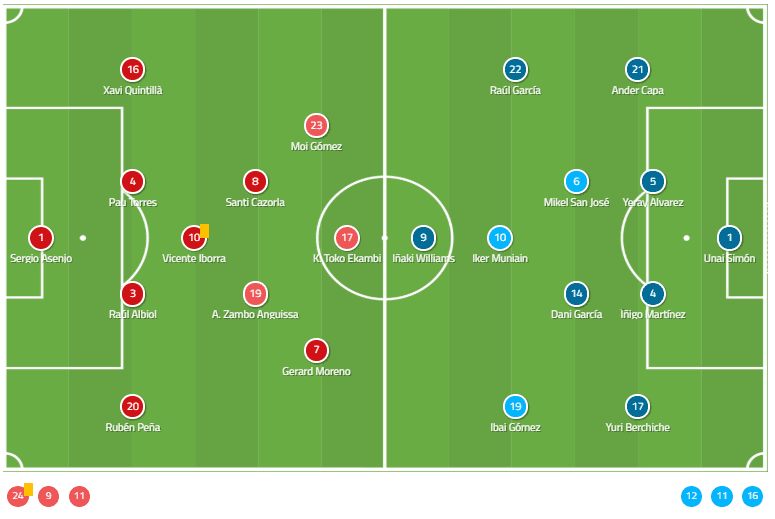
West Ham, led by Matt Beard opted for a 4-5-1 formation, crowding the midfield and leaving Leon up to press. Leon would often alternate with one of the midfielders as the central striker with the priority being to deny City’s midfielders a lot of space in the centre. They defended narrow leaving a lot of space in the wide areas for City to exploit which would have worked fine had they made most of the 53% possession that they had during the game. We shall further see in this analysis why West Ham failed to trouble City at all.
Man City attacking organisation
City’s biggest strength in attack was the technical ability of their central defenders to be comfortable with the ball and distribute them effectively. This gave players like Houghton and Bonner lot of room to find forward players with a diagonal long ball. From early on, we could see the strategy to find Hemp and Wullaert with plenty of space down the flanks because of West Ham’s tendency to defend narrow. After sending the ball wide, the wingers would immediately feed the ball back inside for attacking players like White or Stanway.
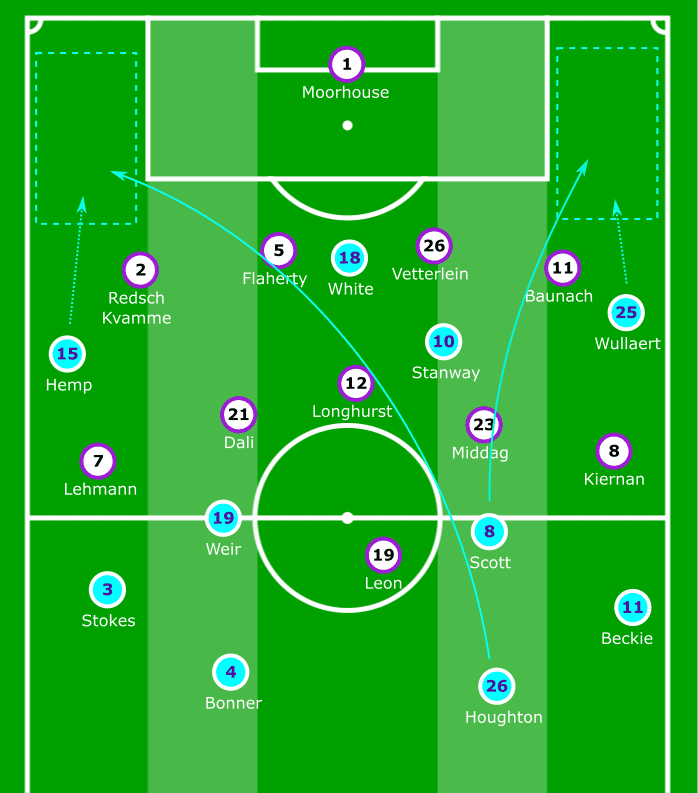
Because West Ham played with five midfielders looking to make it very dense and gain numerical superiority in the centre, City weren’t particularly seeking to circulate the ball through the centre where they were likely to concede possession. Instead the strategy was to immediately play it into the wide areas and move forward. A player like Beckie was utilised effectively in this game with her pace down the flank causing a lot of trouble for the visitors during a switch of play.
In the buildup, City were very positional and looked to exploit pockets of space gained by the opposition pressing them. By moving the West Ham players out of position, attracting the press, an intelligent player like Scott was able to effectively link play between the lines.
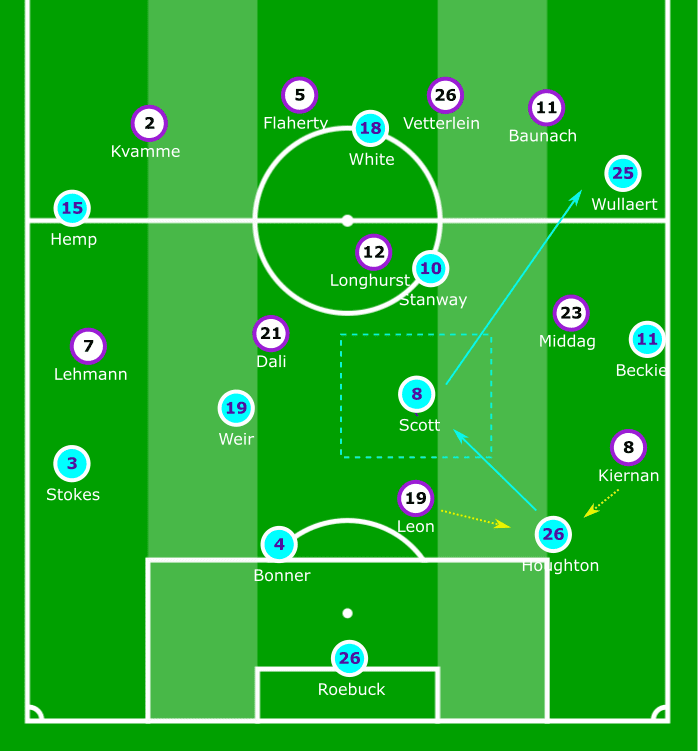
West Ham’s defensive organisation
The strategy to play five midfielders was to gain a numerical superiority in the centre and deny technical players like Stanway, Weir and Scott too much time and space in the middle. We could see this working early on with City conceding possession in the middle. Sitting compact and taking turns to press City’s players West Ham were also able to cut out the passing lanes through the centre of the park and force City out wide.
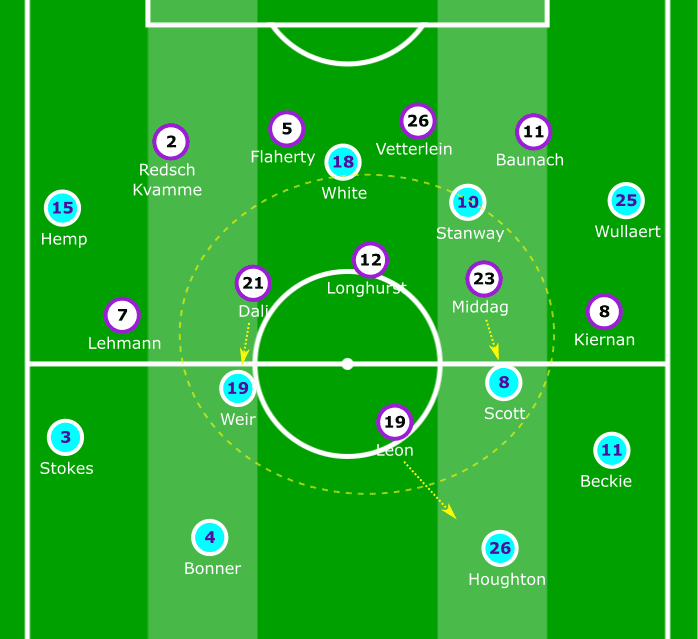
Although the strategy worked well, the problem was that West Ham were not so effective upon gaining possession. They didn’t seem to have a plan how to transition forward and ended up giving back possession to City or being forced out of play.
The Hammers also recognised that the hosts were much better aerially and looked to play out from the back every time from a goal kick. Unfortunately, there was a lack of understanding of defensive and offensive roles among the five midfielders which made this tactic rather redundant and risky. After struggling to play out from the back, the decision to play the ball long backfired upon the visitors as they lost the aerial duel for the goal kick to City who immediately transitioned forward.
The decision to allow City to play wide would have made sense if they defensive structure was solid during defensive transitions. But instead, West Ham invited a lot of trouble upon themselves early on leaving a lot of spaces for City to exploit. They conceded 14 corners during the game to City, almost 10 during the first 30 minutes. City ended up scoring their first goal from a corner that was poorly defended. West Ham opted for a zonal marking in the corner allowing three of City’s players to attack the six-yard box unmarked. White was able to convert the opportunity on the rebound to put City ahead.
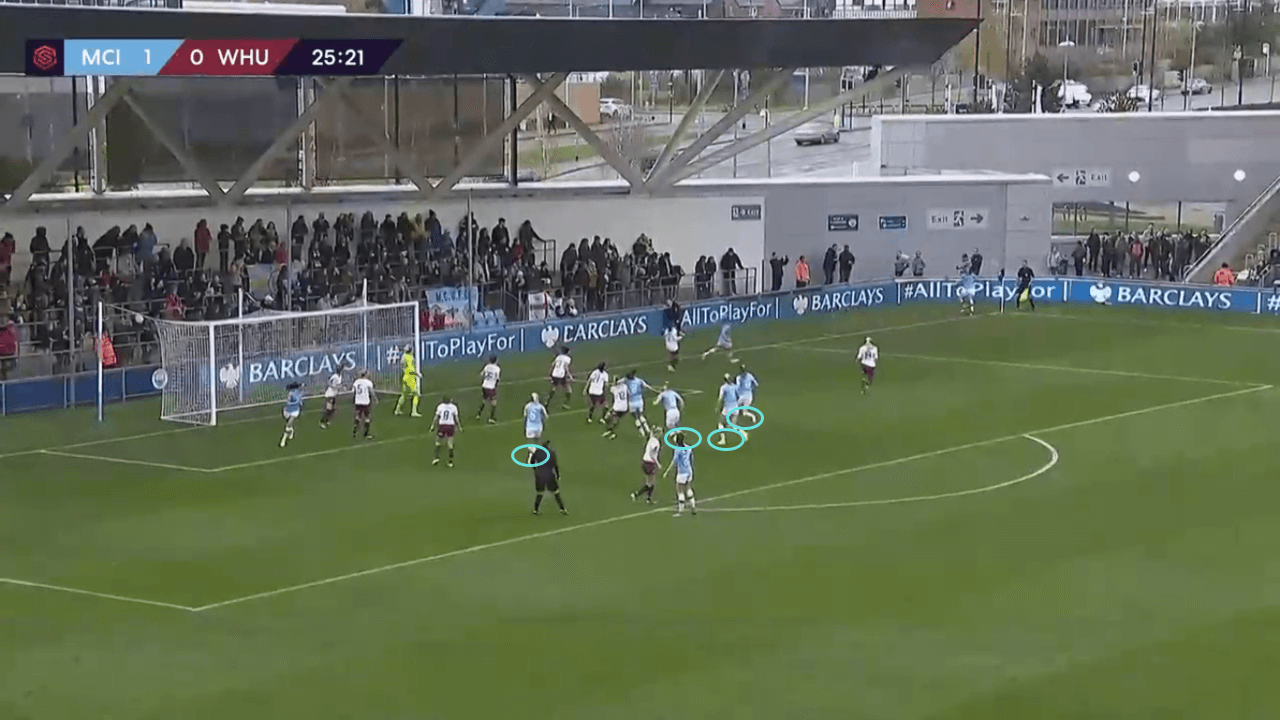
Narrow defending costs West Ham
Despite having the numerical superiority in the midfield, West Ham’s back line looked extremely disconnected from their midfield. After playing the ball into wide areas, City were able to successfully isolate the back line because West Ham’s midfielders were not so strong on tracking back to help out defensively. West Ham also defended very narrow giving City’s wide players room to not only cross the ball inside, but also find space to take shots.
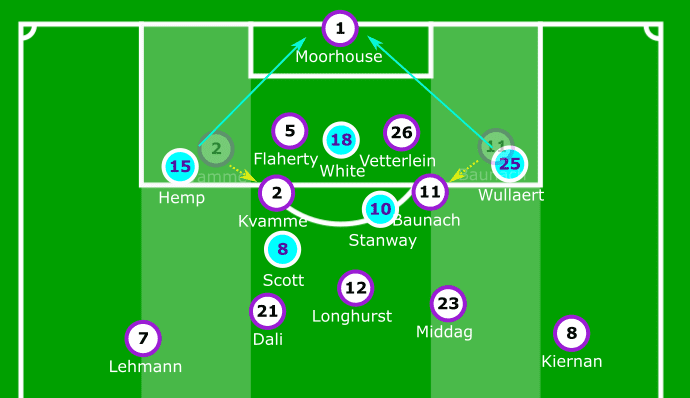
Perhaps West Ham’s biggest weakness was their defensive line which was easily manipulated by City. City managed to score two goals by drawing the fullbacks out of position creating space for the wide player to make a shot on target. In the goal in the first half, we see Jill Scott on the ball. By shaping up her body to shoot, she immediately attracts the press from West Ham’s right back, Redisch Kvamme who leaves her position to close down the shot. This leaves Hemp completely unmarked and with all the space to control the ball with the first touch and create a shot on the near post to score.
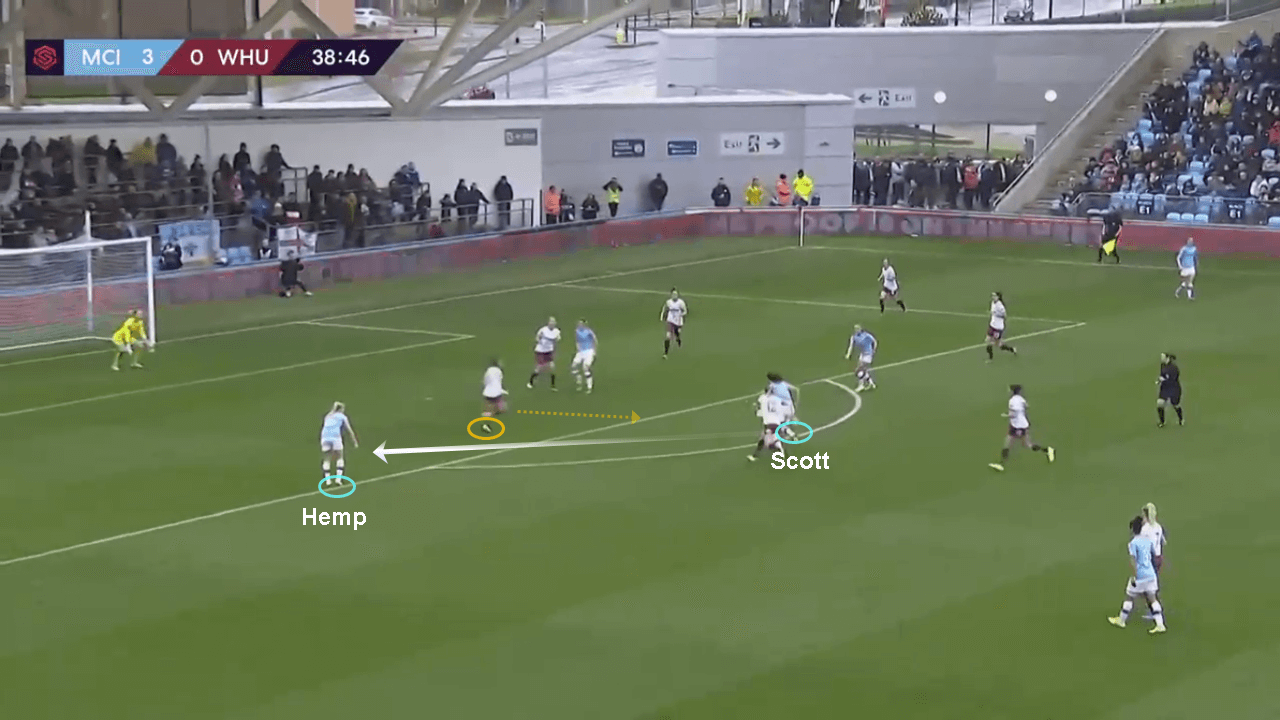
Early on in the second half, we see an exact repeat of this scenario but on the other side. We see Stanway winning the ball while West Ham’s defenders prioritise closing down the central space completely ignoring Wullaert. Stanway manages to feed Wullaert who, similar to Hemp is able to have all the time and space to control the ball and hit it at the far post, beating Moorhouse.
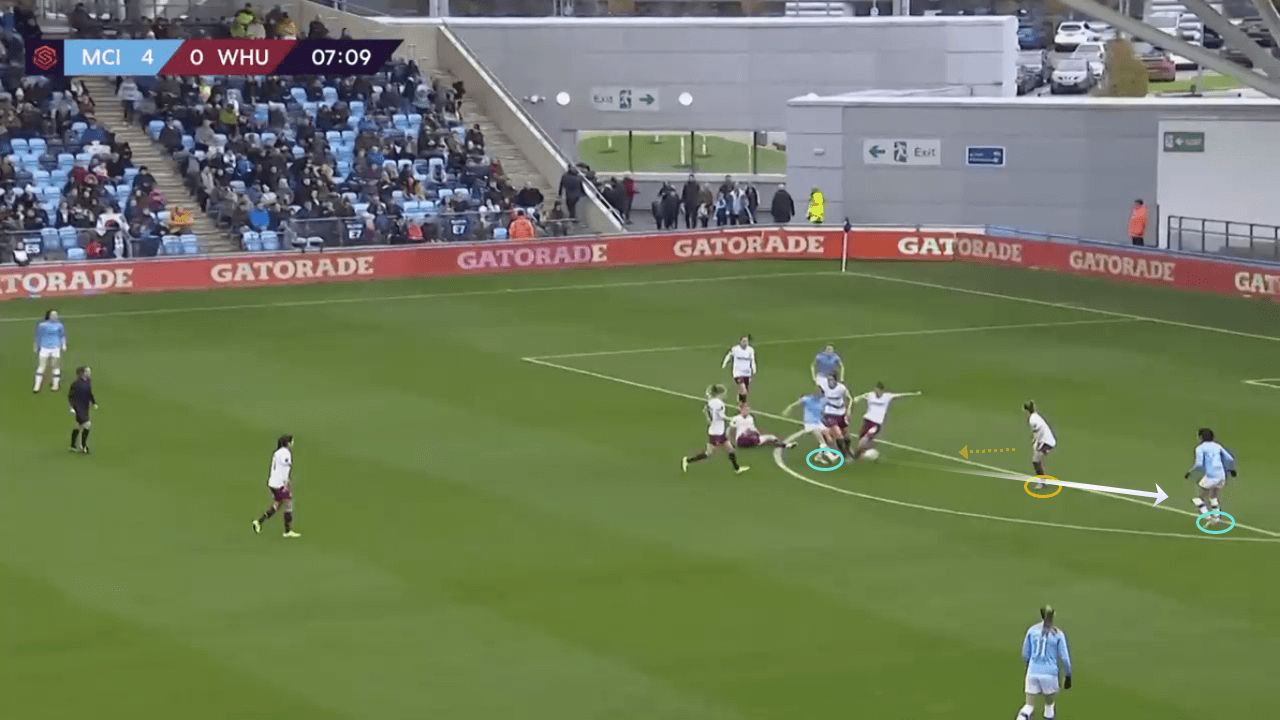
Stanway leads the way
On her 100th appearance for the club, the 20-year-old rising talent Stanway stood out with her two goals in the first half to seal the game for City. Her most effective quality is her shooting ability from any range, angle with one or two touches. In this game, West Ham’s defending errors made it easy for Stanway to find space to hit the target twice.
In this goal, Moorhouse finally opts to play the ball long after multiple failed attempts to progress with the short goal kick. But City win the aerial ball and immediately transition forward. We see how the ball is fed to Wullaert into a wide area. White, Hemp and Wullaert are able to push the West Ham defensive line back effectively, while the midfielders fail to track back. Stanway manages to find room in front of the defensive line at the edge of the box to register a perfectly timed shot to score. This was her second goal during the game, but the first goal was also scored from a similar position.

During the second half, both managers made changes with substitutions. Cushing brought on Pauline Bremer who played alongside White as a striker while Stanway dropped deeper into a box-to-box role. In this role she found herself guilty of lack of discipline in her challenges with a second yellow seeing her sent off 15 minutes before the final whistle. West Ham looked to press higher and managed to register more shots after City were a player down, but failed to open their scoring leaving Roebuck with a well-earned clean-sheet.
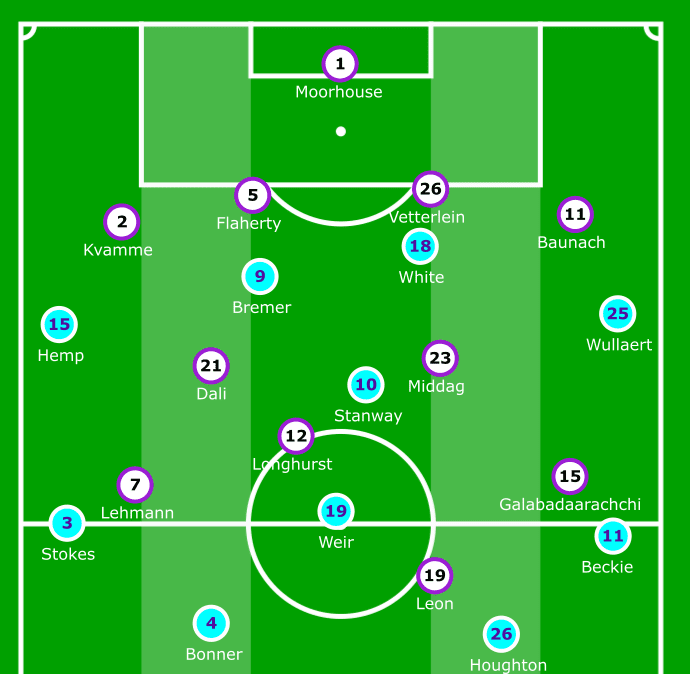
Conclusion
City’s tactics were well applied and created the difference early on during the game. West Ham fell short in multiple departments including set pieces which justifies the big score line. Matt Beard will have a lot of work to do, both offensively and defensively in organising his team in order to bring them back in form with the quality of players that he fields in the FAWSL.
City’s win put them in second place, a point behind leaders Chelsea, and tied on points with Arsenal but ahead with goal difference. With the point difference between the top teams in the league marginal, games such as this with a large tally for City will help them stay ahead on goal difference.

If you love tactical analysis, then you’ll love the digital magazines from totalfootballanalysis.com – a guaranteed 100+ pages of pure tactical analysis covering topics from the Premier League, Serie A, La Liga, Bundesliga and many, many more. Buy your copy of the November issue for just ₤4.99 here





Comments